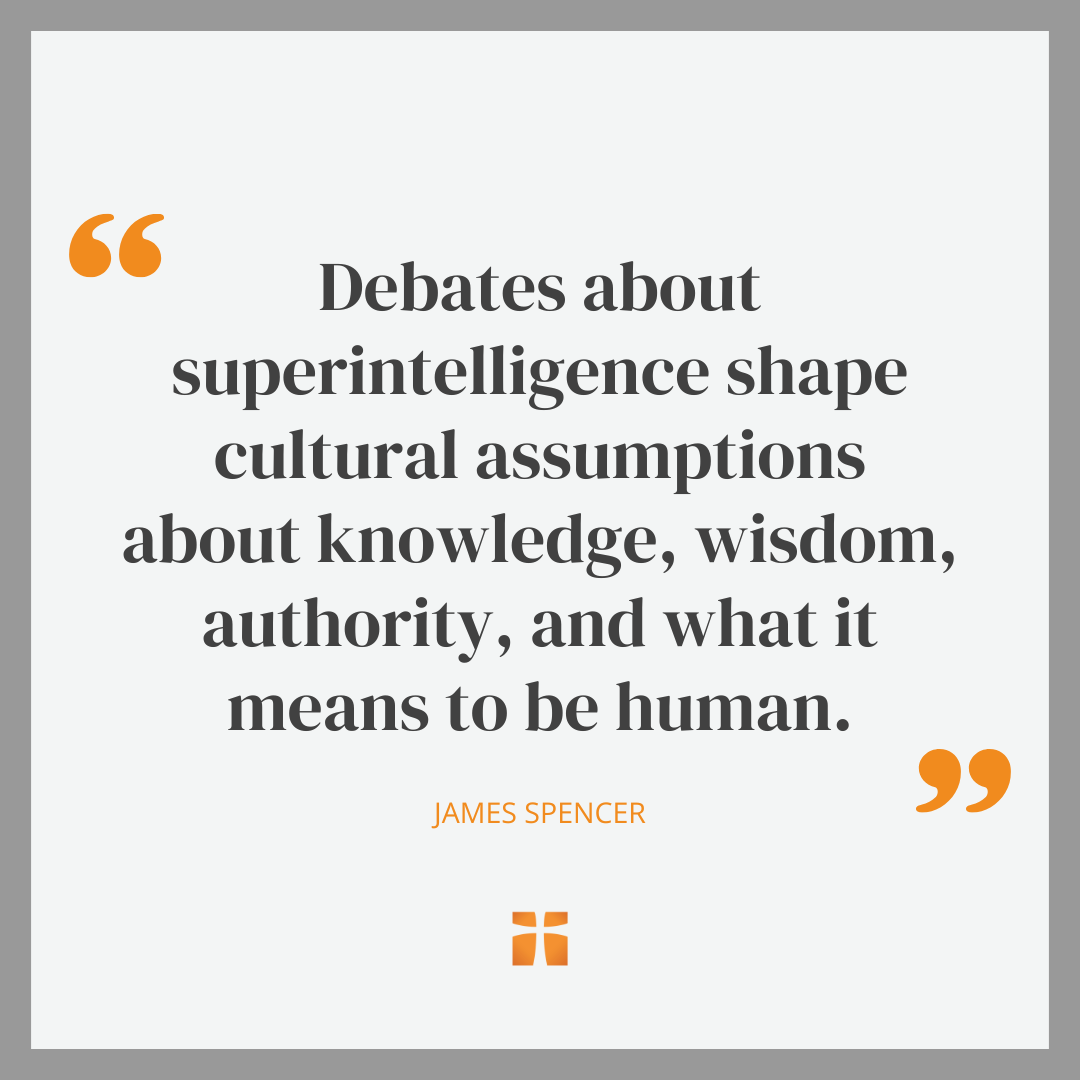There is a growing consensus in the tech sector that achieving superintelligence is only a matter of time, with some estimating that we will see superintelligence by 2030. This consensus, however, is problematic because the current approaches and technologies being employed make superintelligence (we’ll get to what that is in a bit) seem more like science fiction than science. While many in the tech industry believe superintelligence is possible, there is currently no clear, technical path for exponential expansions of AI’s intelligence. Christians should pay attention to these discussions because debates about superintelligence shape cultural assumptions about knowledge, wisdom, authority, and what it means to be human.
We might say that, then, that achieving superintelligence isn’t a matter of time—but a matter in time. It is a development constrained by the same temporal limits that shape all created things. In other words, the quest for superintelligence and superintelligence itself (if it were achievable) are occurring within limitations. Even if superintelligence were created and capable of adapting and learning about the world based on every piece of accessible knowledge, it would be time-bound. As such, it would be incapable of seeing the meaning of events apart from the future that lends the present its significance. It could adapt, anticipate, modify, and problem-solve in the moment and for some anticipated future, but without a real knowledge of the future, superintelligence wouldn’t have any true sense of meaning because the future gives the past and present meaning.
If possible, I’m sure superintelligence will be impressive. Yet even though a new sort of intelligence might be “super” when compared with other time-bound beings, it would still pale in comparison to the omniscient God who stands outside of time and gives meaning and purpose to our lives by revealing to us what is to come. Superintelligence would only ever be able to inform, not reveal. It could provide insights about the world’s patterns by applying knowledge and information, but it can’t steer, it can’t interpret, and it can’t offer anything more than what God already has.
If superintelligence is to be “super” in any meaningful sense, it must use information and knowledge to respond rightly to God. If it doesn’t respond to God, Christians must recognize that superintelligence is severely limited—constrained because it does not acknowledge the patterns of God’s ongoing activity throughout the history of the world.
What Defines Intelligence?
According to Nick Bostrom, “We can tentatively define superintelligence as any intellect that greatly exceeds the cognitive performance of humans in virtually all domains of interest.” This description begs the question: what are “all domains of interest”? I’d be willing to bet that those developing superintelligence are not necessarily interested in developing the capacity to use information about God—the information He has revealed—to respond to the problem of sin, but wish to leave room to bracket out certain areas of knowledge. Instead, they seek a limited intelligence that mimics a human intellect, which denies and distorts the Triune God.
Because intelligence is a process—a capacity—by which information and data are used to navigate a fallen world, any superintelligence that is developed must have the ability to adapt and learn from its surroundings. As the infinitely relevant sociological Actor, the Triune God is part of those surrounding. He must be the governing factor we attend to when we encounter problems. We adapt and learn so that we become more dependent on Him rather than more independent of Him.
Some might call what I’ve described wisdom; however, it is important not to collapse the distinction between knowledge, intelligence, and wisdom. We can think of knowledge as content, intelligence as capacity, and wisdom as manner. The three are deeply interrelated and influence each other in various ways. Note the following:
1. Intelligence guides what and how we learn by directing attention and detecting patterns in the world.
2. Knowledge expands and refines what intelligence can do by providing structure and data.
3. Wisdom orients the whole process theologically, shaping what we seek, how we interpret, and giving us a sense of why it matters.
While these categories could certainly be nuanced and expanded, the simplified framework helps us understand how intelligence is related to Christian conviction: any intelligence that doesn’t detect the patterns of God’s presence and activity in the world is missing something essential.
Because the fear of the Lord is the beginning of knowledge (Prov 1:7), we (humans, and, in particular, Christians) will always have a leg up on any superintelligence. Knowing how the world works and on whom we depend (Deut 30:15-20; 1 Sam 12:14-15) allows us to reorient our attention toward God and detect theological patterns. Unless superintelligence can develop a fear of the Lord,
it won’t have the sort of awe and respect for the Triune God those made in his image can and do. The biblical example of Solomon illustrates this well: God grants him wisdom not because he is intelligent, but because he seeks to honor God and the people under his rule as king. In scripture, wisdom is relational and covenantal—not merely computational.
Am I suggesting that someone (or something) can’t be intelligent without a knowledge of God or that anyone with a knowledge of God is automatically more intelligent than someone without that knowledge? Not at all. But, intelligence, as a capacity influenced by both knowledge and wisdom, is theologically limited when it does not begin with the fear of the Lord.

Is Superintelligence Possible?
Superintelligence is hypothetical and disputed. While the quest for superintelligence makes for popular talking points among tech elites from Mark Zuckerberg to Sam Altman, the path to superintelligence may be more science fiction than actual science. Achieving superintelligence, at the very least, seems like it will be further away than many experts think.
Much of the Artificial Intelligence (AI) we interact with today is based on Large Language Models (LLMs). LLMs learn languages by analyzing the statistical relationships between words and phrases, allowing them to produce human-like text. To accomplish the relatively seamless responses generated by ChatGPT, Claude, or Grok, AIs are trained on massive data sets.
As Cal Newport has recently noted, AI companies theorized that improving pretraining would exponentially improve the AI models. The pretraining process involved the ingestion of “an astonishingly large amount of text.” Pretraining, however, proved to be less effective as time went on, resulting in increases to “model size and training intensity”, resulting in “diminishing returns in capability gains.” Put simply, the AIs didn’t respond the way that those building them anticipated. Newport suggests that the diminishing returns prompted a movement to “post-training,” which promises incremental (rather than exponential) improvements.
The LLM structure seems to be the problem. For instance, Yann LeCun, one of Meta’s superstar AI scientists, is launching his own AI company that will not focus on LLMs, which he believes are a “dead end.” His new company would focus on a world model—an AI system that develops an understanding of its environment and is capable of running cause-and-effect scenarios.
Taking a step back from the rhetoric and the hype, the potential of reaching a superintelligence isn’t as sure as some might have us believe. Conceptually, it is possible to imagine an AI that is smarter than humans. We can imagine an AI that can create an AI even smarter than itself and so on; however, in practice, the technology doesn’t seem to be there, particularly with LLMs. And even if the technical hurdles were cleared, the theological limits would remain: an intelligence that cannot fear the Lord cannot be wise.
How Does Superintelligence Conflict with the Theology of Divinity?
While it isn’t clear that superintelligence is possible, let’s assume for a moment that it is. Impressive as it might be, it would also be a relatively small achievement. Consider, for instance, when the people of the world gathered to build a city and a tower “with its top in the heavens” (Gen 11:4), God still had to come down “to see the city and the tower” (11:5). The people’s accomplishment should not be minimized, but it should not be overstated either. No matter how great the city and tower may have been, they are still human efforts that can’t reach or replace the power of God. Even our greatest achievements pale in comparison to the work of the Triune God.
Technological advancements can be beneficial, but they can also fool us into thinking that we are independent of God. We forget that God has given us the power to do everything that we do (Deut 8:17-18). As such, our accomplishments should point us toward God. They should cultivate gratitude and humility rather than pride.
I don’t know if superintelligence is possible. Maybe some tech genius will figure it out, maybe not. Either way, Christians need to keep superintelligence in theological perspective because intelligence—even superintelligence—can’t save us. It may help alleviate some of the pains that come with life in a broken world (and that’s a good thing), but it should not inspire the sort of awe and worship that only God deserves.
Photo Credit: ©Unsplash/Marjan Grabowski






